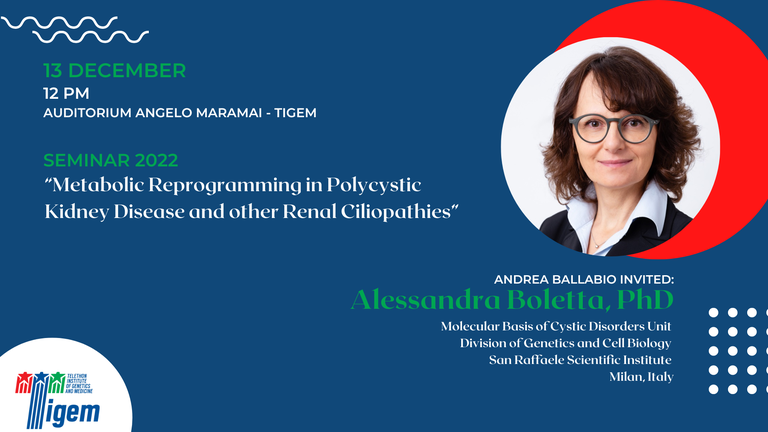Alessandra Boletta, PhD _ "Metabolic Reprogramming in Polycystic Kidney Disease and other Renal Ciliopathie"
- When Dec 13, 2022 from 12:00 PM to 01:15 PM (Europe/Berlin / UTC100)
- Where Tigem Auditorium Angelo Maramai
- Contact Name Andrea Ballabio
- Contact Phone 08119230659
-
Add event to calendar
iCal

- https://www.tigem.it/newsroom/seminars/alessandra-boletta-phd-_-metabolic-reprogramming-in-polycystic-kidney-disease-and-other-renal-ciliopathie
- Alessandra Boletta, PhD _ "Metabolic Reprogramming in Polycystic Kidney Disease and other Renal Ciliopathie"
- 2022-12-13T12:00:00+01:00
- 2022-12-13T13:15:00+01:00
Alessandra Boletta, PhD (Short CV)
Molecular Basis of Cystic Disorders Unit, Division of Genetics and Cell Biology
San Raffaele Scientific Institute, Milan, Italy
Abstract
Autosomal Dominant Polycystic Kidney Disease (ADPKD) is the most common life-threatening genetic disorder, with an incidence of 1:500 to 1:1000, and it accounts alone for approximately 10% of all patients in renal replacement therapy in the world. The majority of cases are due to mutations into two genes (PKD1 and PKD2), that encode for two very large membrane proteins called the polycystins. Approximately 8% of cases are not attributable to mutations in the two above genes and additional ones were recently identified to be mutated in ADPKD-like cases. The newly identified genes point to defective maturation of the polycystins as a likely pathogenetic event.
The function of the Polycystins remains largely elusive, despite having been identified almost 30 years ago. The two proteins form a large receptor/channel complex, conducting cations and localize into primary cilia, as well as in other subcellular locations, including cell-cell/matrix junctions at the plasma membrane, mitochondria and mitochondria-associated-membranes of the ER (MAMs). The disease is due to loss-of-function of the polycystin complex. Work from our lab has demonstrated that Polycystin-1 regulates cell migration, polarity and cytoskeletal organization, events that we believe could justify initiation of cyst formation. Expansion of cysts is next driven by multiple factors including proliferation and fluid secretion. Multiple pathways have been shown to drive these events. Additionally, matrix deposition and inflammation further contribute to disease progression and renal functional decline.
Our lab has demonstrated that a fundamental characteristic of PKD is a profound reprogramming of bioenergetic metabolic pathways that include enhanced glycolysis (the Warburg effect) as well as glutaminolysis, which drives fatty acids biosynthesis. Notably, mitochondria are severely damaged in PKD and oxidative phosphorylation reduced. These derangements led us to design two possible therapeutic approaches, one of which is about to enter a clinical trial. In the attempt to understand where the metabolic alterations originate from, we have investigated the potential role of mitochondrial derangement in driving cyst formation in vivo and the possible role of cilia in regulating some of these metabolic changes. Our data indicate that an intricate cross-talk between cilia and mitochondria takes place, leading us to propose that some of the metabolic alterations in ADPKD might be modulated (or driven) by cilia. Our data also indicate that metabolic alterations are likely occurring in other renal ciliopathies, though profoundly different from PKD.
